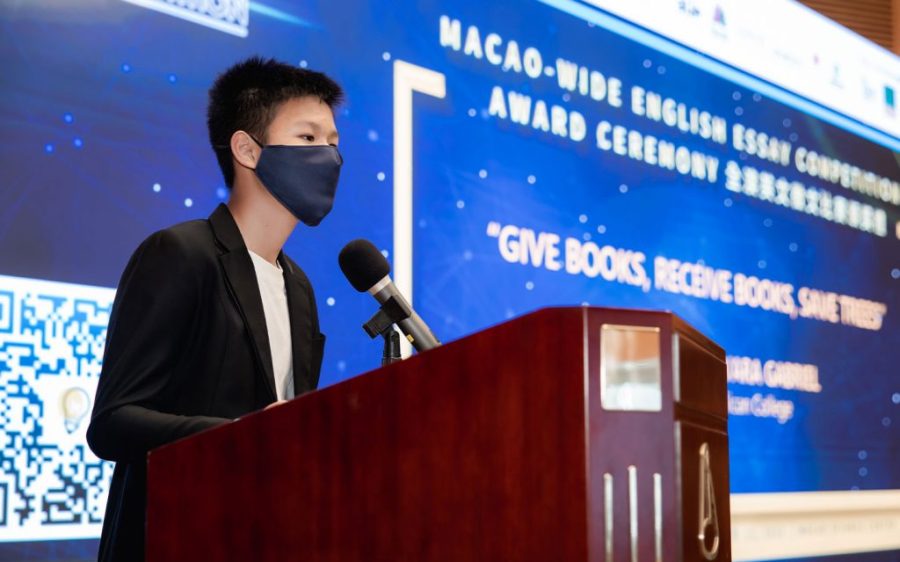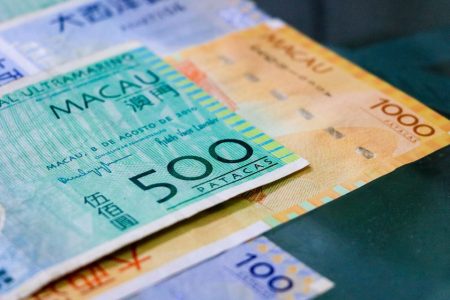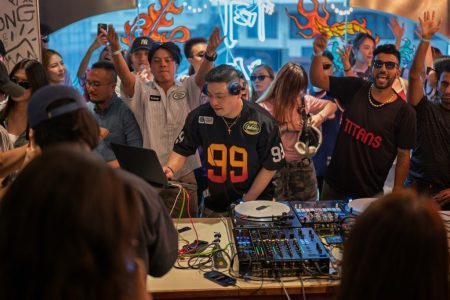“Surprised and proud,” says Devara Gabriel Wangke, when asked how he felt after winning a prize at the inaugural Macao-wide English Essay Competition 2021-2022 (MEEC) in March 2022.
“I didn’t expect to win at all,” says Indonesia-born Wangke, 14, who took home a first-place trophy in the Middle School category for his essay “Give Books, Receive Books, Save Trees”. Aligned with the competition’s theme, “The Change I Want To Make”, the winning piece encourages students to protect our forests by donating used textbooks to incoming students. “I think in a world full of pollution, trees are essential in ensuring that humans can still get access to clean air,” says Wangke, a Form 3 student at Macau Anglican College.
Now in its second year, the MEEC again strives to provide participating students like Wangke with an opportunity to develop their critical thinking skills and learn more about global issues, such as climate change, gender equality, food waste, sustainability, children’s education and poverty. As such, each competition centres around the 17 Sustainable Development Goals (SDGs) set up in 2015 by the UN as part of its 2030 Agenda for Sustainable Development.
“It is important that people my age know these topics [SDGs] since our world is deteriorating and we need some real ideas that can at least improve it,” says Wangke. “This competition encourages students to think about creative and applicable solutions that will hopefully make this messy and problematic world, somewhat, a better place.”
More than a writing competition

Founded in 2019 by the Macao Professional Speaking Association (MPSA) – a local organisation of professional speakers and public speaking talents who appreciate the power of communication – the MEEC is on a mission to inspire students to learn more about the impact they can make in their communities and encourage critical thinking.
The idea came about after MPSA held speech competitions with students and saw how much youth could contribute to social conversations. “We asked, ‘What else could they do to bring positive changes in the local community?’” recalls Sandy Leong, MPSA’s executive vice president and the MEEC organising committee chair.
Written essays, ranging from 150 to 900 words depending on the age group, seemed like a natural extension. But MPSA wanted to host more than a one-dimensional writing competition by focusing on global sustainability and other social issues, rather than just mechanics.
For Leong, it was about sharing the “idea of change” with students and asking them how they hope to bring about that change, she says. “The 17 SDGs provide a really good blueprint for a better future. Instead of giving students a simple theme, this competition gives them a research direction and a choice of what goal to write about.”
In its first year, over 1,600 students from 52 schools and universities or colleges registered to take part in the free competition, which covers four categories: Upper Primary, Middle School, High School and College. To judge the essays, MPSA recruited a panel of 30 evaluators from different industries and backgrounds, then randomly assigned each judge to critiqued 30-45 essays based on content, organisation, mechanics and originality.
“Is your content cohesive and in line with the theme? Is your work original? Do you add fresh thinking or a different point of view to this idea?” says Leong of the assessment criteria. When it comes to organisation, the judges are looking for writing that has a well-designed structure, from a clear title to the introduction, body and conclusion. Meanwhile, mechanics focuses on things like spelling, punctuation and grammar.
After the evaluation process, during which each essay was evaluated by a minimum of three judges, the panel chose one First Prize winner, three Second Prize winners, five Third Prize and eight Honourable Mentions per category. In addition, MPSA compiled and printed more than 400 essay collection books featuring the 68 winning essays, then distributed them among winners, sponsors and schools. The books are also available for purchase via their website or from the Plaza Cultural Macau Bookstore.
A platform for young voices

Following the success of its first edition, the association plans to hold the MEEC annually and will continue to choose themes related to the 17 SDGs. For instance, the MEEC 2022-2023 theme is “An Inclusive World”, which Leong says is very open-ended. “When you talk about inclusiveness, it’s not just about gender equality, but even poverty, because everything is interlinked,” explains Leong. “How the students build that link is the creative aspect of the competition.”
Even though English is not an official language in Macao, the judges were impressed by the level of proficiency in the 2021 submissions. Among the judges, who hail from a wide range of professional backgrounds was Andreia Ramos, a researcher and postdoctoral student at the University of Saint Joseph’s Institute of Science and Environment.
“It was good to see different ways of writing and so many varied opinions about the same topic,” says Ramos, who read 30 essays in the College category. “Some of the students shared the life experiences that motivated them to write the essay. It was difficult for me to pick the winners because the essays were all good.”
In addition to practicing English writing and critical thinking abilities, Ramos also believes that MEEC helps participants improve their scientific writing. “They’re not just giving their opinions but also providing scientific basis on the topics they write about,” she explains. “It’s also important that the students can express their thoughts freely.”
Leong agrees, adding that the focus of the competition is to communicate ideas clearly “in a way that the audience can understand”, so the reader can be persuaded. “The goal of the competition is to drive young people to learn more about the world they live in. And to inspire them to act like global citizens, voice their opinions, and work with stakeholders to make the world more inclusive – that would be a success.”
The opportunity to voice his opinion is what drew Wanke to the competition in the first place. He actually didn’t set out to win the Middle School category in 2021 – he simply wanted to raise awareness about deforestation. As Wangke points out in his essay, over 30 million trees are cut down annually to make textbooks in the US alone.

If he had to offer advice to future participants, Wanke recommends writing in a logical and concise style. “Fancy words don’t earn you extra points unless those words convey a clear meaning or message,” he says. “Focus on your ideas.”
“[Our] ideas are valuable because young people tend to be more creative and our ideas are not usually influenced by economic interests or business gains. That is why it’s also important that the students write about something they are passionate about so they can also enjoy writing about what they truly value and believe in.”
Registration for this year’s MEEC closed in early December. The judging will begin in January 2023 with the results to follow in February and an award ceremony scheduled to take place in April. In addition to a trophy or a certification, winners will again see their essay published in an MEEC essay collection book.






